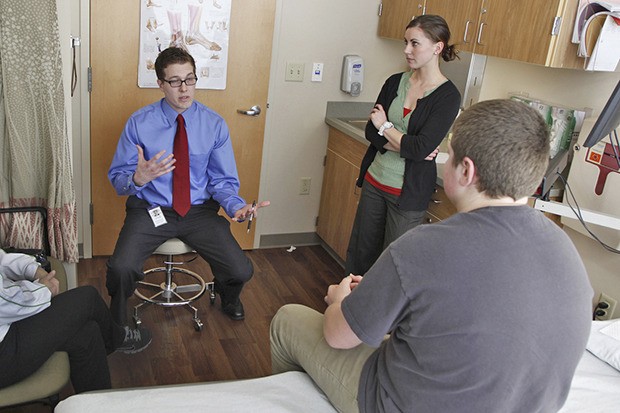By Dr. Joshua Purses,
MultiCare Orthopedics & Sports Medicine
For the Reporter
As kids return to school and fall sports seasons get under way, it’s a good time for a reminder about the danger of concussions.
Here in Western Washington, parents and coaches are increasingly aware of concussions, thanks in part to education surrounding the state’s Zackery Lystedt Law that requires medical clearance before young athletes can return to play after a concussion.
For athletes of all ages, an increased level of awareness can make a huge difference. While less can be done to truly prevent concussions, it’s important to recognize when a concussion occurs so that the athlete can be removed from the game and avoid potentially more serious consequences.
If an athlete keeps playing after a concussion, that’s a big problem.
One danger is post-concussive syndrome. Essentially, this is like having a concussion longer than six weeks. In addition to headaches and other concussive symptoms, the athlete often struggles academically and may develop depression.
Another danger is second-impact syndrome. If a player takes a blow the head, then returns to play and takes another blow before fully recovering – even a week later – the person can develop severe swelling in the brain, which can lead to death.
If there’s any question, it’s always safer to assume it’s a concussion and pull the child out of competition, rather than ignoring it and going about your business.
Basically, a concussion occurs after a blow to the head or face, or even elsewhere in the body if the forces are transmitted to the head (like whiplash). The person might experience headache, dizziness, nausea, vomiting or just feel “not quite right.”
To determine when an athlete can return to play, only athletic trainers, physicians, nurse practitioners and physician assistants are licensed in the state of Washington to make that evaluation.
Most concussion injuries can be treated by following up with a primary-care provider, or someone who is trained in concussion management. More urgent evaluation would be needed if the athlete is unable to communicate, has a rapidly worsening headache or has a seizure. If a school has an athletic trainer, students should take advantage of that. Athletic trainers can help them decide if they need to receive further care or see a doctor.
In my office, we most commonly see concussions from football, followed by soccer. Other sports, such as lacrosse and hockey, have a high frequency of concussions, but fewer people play those sports, so we don’t see as many of those cases.
As far as prevention, there are a lot of questions about helmets and headgear in football and soccer.
In football, there is no perfect helmet that prevents all concussions. It just doesn’t exist. Parents should be wary of such claims. The key is to have a newer-generation helmet that has been properly fitted.
In soccer or other sports, there isn’t any convincing medical evidence that protective headgear truly prevents concussions, so it’s not recommended at this time. In soccer, concussions are usually caused by collisions – either head-to-head or falling to the ground. If a player has good technique while heading the ball, it’s not supposed to cause concussions. Younger athletes may be more prone to have bad technique, which could be detrimental.
A baseline test conducted before the season can be used for comparison if an athlete sustains a concussion during the season. The computerized program can help evaluate a person’s reaction time, memory and concentration. The test can help determine when the person is back to normal. It’s not absolutely necessary, but it can help determine when it’s safe to return to play. The tests can be done in the offices of MultiCare Orthopedics & Sports Medicine, or large group visits can also be arranged, if a team is interested. To set up an assessment, call 253-792-6555.
When we’re talking about kids, it’s not worth taking the risk of putting them in harm’s way.
The key is to be aware of the possibility of concussion, and not let athletes return to play until they’ve been evaluated.
Dr. Joshua Purses is a primary care sports medicine physician with the Sports Concussion Program at MultiCare Orthopedics & Sports Medicine. To learn more, call 253-792-6555 or visit www.multicare.org/sports-concussion-program/
====
What is a concussion?
A concussion is most often caused by a sudden direct blow or bump to the head. However, it can also occur as a result of an indirect blow to a different part of the body. Brain injury is the leading cause of sports-related death to children.
There are some common physical, mental and emotional symptoms a person may display following a concussion. Any of these could be a sign of concussion:
• Confusion or feeling dazed
• Clumsiness
• Slurred speech
• Nausea or vomiting
• Headache
• Balance problems or dizziness
• Blurred vision
• Sensitivity to light
• Sensitivity to noise
• Sluggishness
• Ringing in ears
• Behavior or personality changes
• Concentration difficulties
If you think your athlete has any of these symptoms, contact a physician immediately.
– Source: MultiCare Orthopedics & Sports Medicine
Talk to us
Please share your story tips by emailing editor@kentreporter.com.
To share your opinion for publication, submit a letter through our website https://www.kentreporter.com/submit-letter/. Include your name, address and daytime phone number. (We’ll only publish your name and hometown.) Please keep letters to 300 words or less.

